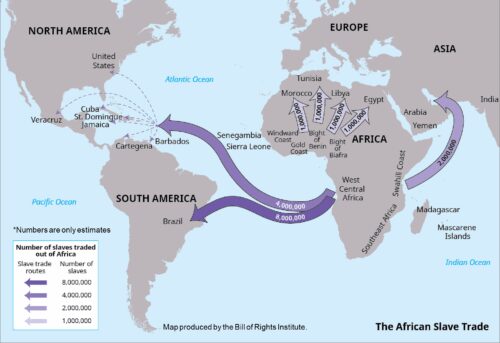How Afro-Latinos Came To Be
Share
Breaking News!
Today's news and culture by Black and other reporters in the Black and mainstream media.
Ways to Support ABHM?
By Scholar-Griot: Melanie Falu

Afro-Latinos are descendants of the formerly enslaved Africans in Latin America and the Caribbean. You probably know about slavery in the United States, but what do you know about slavery south of our border?
Millions of Black Africans were brought as slaves to Central and South America and the islands in the Caribbean Sea. At that time, Spain ruled most countries there, including Mexico, Cuba, Puerto Rico, Colombia, and Argentina - while Portugal ruled Brazil and France controlled French Guiana and a few islands in the Carribean. Naturally, the Indigenous residents of these places had to learn to speak Spanish, Portuguese or French. So did their African slaves. (Because the Spanish, Portuguese and French languages came from the Latin language, Spanish, Portuguese and French speaking nations in the Americas make up Latin America.)
Slavery in Latin America and in the Caribbean was somewhat different from slavery in the US. In the Caribbean islands and Brazil, enslaved Africans were often able to hold on to parts of their cultures. For example, they kept African music styles like conga and drumming. They practiced African spiritual traditions and added African flavors to local foods. Dishes like plátanos, alcapurrias, meals wrapped in banana leaves, and Brazil’s feijoada all show this rich history.
Many North Americans assume that people who look Black don’t speak Spanish, Portuguese or French - or come from Latin America. They are surprised when Afro-Latinas and Afro-Latinos speak fluently Spanish, Portuguese and French or celebrate Latin music and food. Few understand how racially diverse Latin America really is. They don’t realize how deeply African cultures shaped Latin cultures.
Read Melanie Falu's essay,
"I'm a Proud Afro-Latina!"
Melanie Falu's contribution to ABHM reflects not only her professional expertise but also her personal testimony, offering readers a powerful perspective that bridges lived experience with broader social understanding. She is a Certified Professional in Talent Development with more than a decade of experience guiding professionals through transformation in corporate, legal, and technology sectors. With a background in Information Technology Project Management (M.S., NYU Polytechnic School of Engineering) and Social Sciences (B.A., The College of New Rochelle), she specializes in career strategy, adult learning, and change management. Melanie brings to her work a commitment to transparent communication and empowering others to navigate pivotal moments with clarity and purpose.









Comments Are Welcome
Note: We moderate submissions in order to create a space for meaningful dialogue, a space where museum visitors – adults and youth –– can exchange informed, thoughtful, and relevant comments that add value to our exhibits.
Racial slurs, personal attacks, obscenity, profanity, and SHOUTING do not meet the above standard. Such comments are posted in the exhibit Hateful Speech. Commercial promotions, impersonations, and incoherent comments likewise fail to meet our goals, so will not be posted. Submissions longer than 120 words will be shortened.
See our full Comments Policy here.